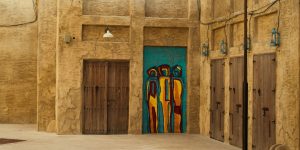
United Arab Emirates – Culture, Customs, Traditions
The United Arab Emirates (UAE), situated at the crossroads of the Middle East, epitomises the perfect unison of age-old traditions and modernity. Behind the famous skyline of Dubai and the lavish resorts of Abu Dhabi is a carefully preserved UAE cultural heritage nurtured over centuries, weaving a complex cultural fabric, making it one of the significant reasons to visit the UAE. A highly Westernised country rooted in Islamic culture, following a decent modern dress code, Dubai culture is a unique pillar of the UAE heritage. An Arab Islamic state practising the Sharia Law with contemporary architecture, buzzing nightlife, luxurious shopping malls, and rich cars, UAE flaunts the perfect blend of the West and East. Are you in for a deep read about a nation with more than 88% of the population filled with expats yet persistent in its unique culture? In this special edition of a thoroughly researched blog and traveller’s guide on the Culture, Customs, and Traditions of the United Arab Emirates, you will get a comprehensive idea of the Emirati culture and heritage and how to experience Emirati culture in Dubai. A Rich Tapestry of History and Heritage: The present-day cultural aspect of the UAE dates back to ancient times. These areas were inhabited by indigenous peoples called “Bedouins”, who would move on camel caravans for trade and sustenance. These desert dwellers brought about the formative cultural development of the UAE, which we now proudly call the cultural heritage of the UAE. The cultural passing of their traditions, such as the nomadic heritage, valuable hospitality and Arabic greetings, intricate handicrafts and eloquent poetry, and their style of community living are preserved dearly to date in the traditions of UAE. The coming of Islam in the seventh century after the opening of Mecca transformed culture and society into a form that persists in the Arabian Peninsula, leading to the beginning of a new era in the history of the UAE. The embracement of Islam in the Arabian peninsula accompanied a significant change in lifestyle practices, more so to become the Emirati heritage majorly. With prominent celebrations of the holy month of Ramadan, education of Islam and its practices in schools and Islamic infrastructure around the state, a significant part of UAE’s Cultural heritage is influenced by Islam. The historic Silk Road saw the Emirates as a major crossroads that helped shape cultural links between different communities, significantly contributing to the region’s identity. In the UAE, Islam is more than just a religion; it is an integral part of Emirati cultural norms and societal structure. Cities are permeated with the sound of prayer calls, and the country is dotted by mosques, which serve as holy places for prayers and local centres for interaction. Islam is integrated into all aspects of life and defines family relations and business affairs. The whole country experiences a transformation in Ramadan. Muslims refrain from eating and drinking between dawn and sunset and indulge in a path of spiritual growth, empathy, and gratefulness. Iftar, or the breaking of fast, is a ritual for people within families and friends where they meet and eat to foster relationships and strengthen bonds. Language and Communication: The Heart of Emirati Society Marhaba! (Hello!) The United Arab Emirates is multicultural, and the language of choice is Arabic, which unites all the people in the UAE. Although most people can speak in English, especially in urban areas with a business background, Arabic represents the language of culture, heritage, and intimate conversations. The Arabic language mirrors the region’s poetic tradition with its complex calligraphy and vast vocabulary. Being the national language of the UAE, Arabic carries the weight and package of the culture and traditions of the UAE. Being a Semitic language, Arabic has various dialects. Emirati Arabic is the most standardised and popular version, while Gulf Arabic is the most widely spoken by the locals. Bedouin dialects, Egyptian Marsi, and other variations across the desertland will also be found. Apart from Arabic, English is the second most widely used language for personal and professional communication. UAE is a central global hub, with expatriates forming a significant part of the population, so English has become necessary. Communication is vital in the UAE. Adab is an essential aspect of Emirati culture; it refers to expressions of courtesy and respect used in daily communication. The greeting is usually accompanied by a warm hug and inquiries about each other’s well-being, which reflects the importance of interpersonal ties in Emirati culture. Hospitality and warm greetings are a significant benchmark of UAE and Dubai culture. A sweet encounter over a cup of Arabian Coffee or Gahwa is a must for the Arabs. Another fascinating local custom of the Dubai cultural highlights is the nose greeting. Arabic men greet each other by touching each other’s nose or a peck on the cheek. Hospitality, or more precisely ‘diwan’, is a characteristic that is deeply embedded in the Emirati culture. The Emiratis derive great joy from being hospitable by welcoming guests with open arms. They also show their hospitality by serving guests delicious meals and traditional sweets. Majlis is an integral part of a typical home setting among the Emiratis. Family members and guests gather for discussions and story-telling while enjoying the fragrant Arabic coffee. Embracing Emirati Traditions: From Clothing to Cuisine National dress, or traditional attire in the UAE, manifests Emirati culture and heritage. Rarely will you find an Arab wearing a modern dress because a sense of clothing is an integral part of their Emirati traditions. These are not only outfits; they reflect cultural pride and compliance with local Emirati customs and traditions. Complex designs are another characteristic of UAE garments in different country regions. Embroidery and styles will differ depending on the emirate; thus, they create a visual narrative about the wearer’s heritage. Let us look at some traditional Emirati practices, from clothing to traditional Emirati food. Kandura, also known as Thawb, is a long, flowing white cloak for a man. It is a loose-fitting


